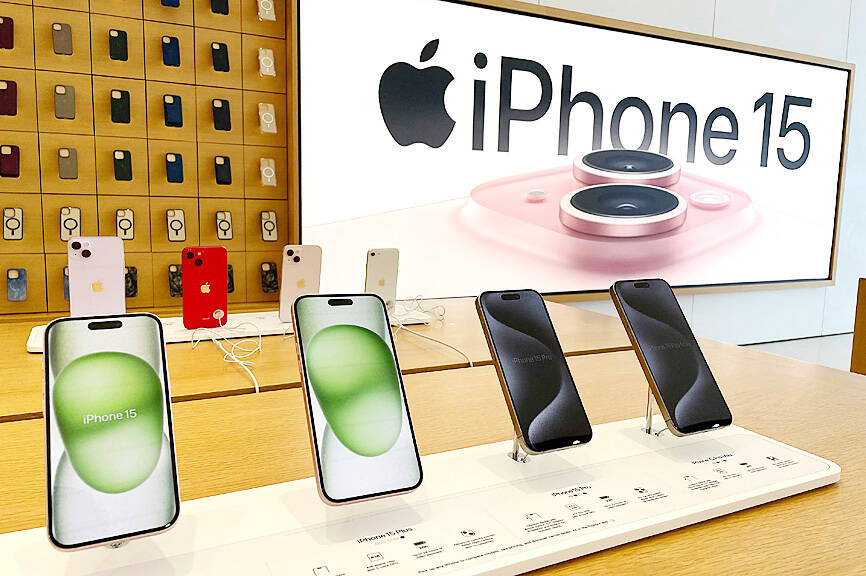Apple Inc’s disappointing holiday-quarter outlook has cast a spotlight on its mounting problems in China, where the iPhone maker is struggling with the unexpected rise of Huawei Technologies Co (華為) and an increasingly hostile business environment.
Apple, which is trying to reverse several successive quarters of revenue decline, on Thursday reported its lowest revenue from the Greater China region since the middle of last year.
Revenue fell to US$89.5 billion in the fiscal fourth quarter, which ended on Sept. 30. That compared to an average Wall Street estimate of US$89.4 billion. Apple’s shares slid more than 3 percent after that number missed the average of five analysts’ projections by 11 percent.

Photo: AFP
Apple CEO Tim Cook assured Wall Street that iPhone demand remains strong in China, blaming Mac and iPad weakness instead.
However, he also predicted flat December-quarter revenue, dampening analysts’ expectations of a growth rebound.
“The challenges that Apple faces in China are unprecedented,” International Data Corp analyst Will Wong said. “It not only needs to deal with the political tensions and Huawei’s competition, but also a different consumer sentiment that is more rational and cautious in spending.”
Apple’s revenue in Greater China declined 2 percent — a steeper drop than the companywide figure. There are signs that the trend might persist: Initial sales of the iPhone 15 in China were 6 percent lower than its predecessor in part because of incursions by Huawei, the consultancy GfK said.
Aside from stronger competition, Apple faces growing risk from political tensions between Washington and Beijing.
Beijing has expanded a ban on Apple products to state-backed firms and government-backed agencies. Hon Hai Precision Industry Co (鴻海精密) — which assembles the majority of Apple’s iPhones from its Chinese factories — is now under investigation over taxes and land use.
Shares of Hon Hai, also known as Foxconn Technology Group (富士康科技集團), and fellow iPhone assembler Pegatron Corp (和碩) fell 1.24 percent and 0.65 percent respectively yesterday.
Still, the iPhone continues to make inroads in the world’s biggest smartphone market, Cook said.
Various models accounted for the four top-selling phones in urban China, he said.
“China is an incredibly important market,” he said during a post-earnings conference call with analysts. “And I’m very optimistic about it.”
He did not face any direct questions about the situation.
If the overall Chinese smartphone market is contracting — as analysts have said — Apple’s results suggest that it is winning market share, Cook said.
He also touted that the company is opening a new store in the country this week. It is coming to Wenzhou in eastern Zhejiang Province and will be the company’s 46th in the region.

South Korea’s equity benchmark yesterday crossed a new milestone just a month after surpassing the once-unthinkable 5,000 mark as surging global memory demand powers the country’s biggest chipmakers. The KOSPI advanced as much as 2.6 percent to a record 6,123, with Samsung Electronics Co and SK Hynix Inc each gaining more than 2 percent. With the benchmark now up 45 percent this year, South Korea’s stock market capitalization has also moved past France’s, following last month’s overtaking of Germany’s. Long overlooked by foreign funds, despite being undervalued, South Korean stocks have now emerged as clear winners in the global market. The so-called “artificial intelligence

NEW IDENTITY: Known for its software, India has expanded into hardware, with its semiconductor industry growing from US$38bn in 2023 to US$45bn to US$50bn India on Saturday inaugurated its first semiconductor assembly and test facility, a milestone in the government’s push to reduce dependence on foreign chipmakers and stake a claim in a sector dominated by China. Indian Prime Minister Narendra Modi opened US firm Micron Technology Inc’s semiconductor assembly, test and packaging unit in his home state of Gujarat, hailing the “dawn of a new era” for India’s technology ambitions. “When young Indians look back in the future, they will see this decade as the turning point in our tech future,” Modi told the event, which was broadcast on his YouTube channel. The plant would convert

‘SEISMIC SHIFT’: The researcher forecast there would be about 1.1 billion mobile shipments this year, down from 1.26 billion the prior year and erasing years of gains The global smartphone market is expected to contract 12.9 percent this year due to the unprecedented memorychip shortage, marking “a crisis like no other,” researcher International Data Corp (IDC) said. The new forecast, a dramatic revision down from earlier estimates, gives the latest accounting of the ongoing memory crunch that is affecting every corner of the electronics industry. The demand for advanced memory to power artificial intelligence (AI) tasks has drained global supply until well into next year and jeopardizes the business model of many smartphone makers. IDC forecast about 1.1 billion mobile shipments this year, down from 1.26 billion the prior

People stand in a Pokemon store in Tokyo on Thursday. One of the world highest-grossing franchises is celebrated its 30th anniversary yesterday.